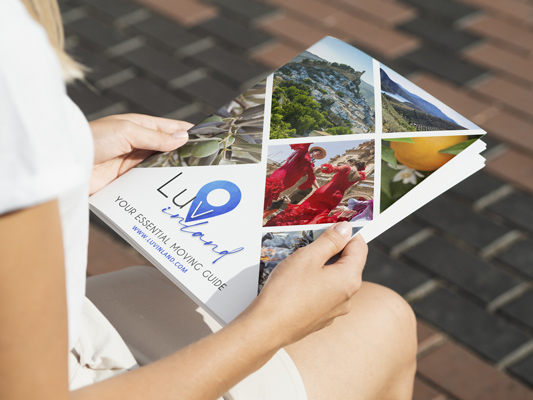Dreaming of settling in a nice villa with mountain views or a charming townhouse? It’s true, Andalucia offers a warm climate, life is relaxed and balanced,… You can’t put it into words and you definitely can’t explain it to others.
The Spanish life – you just feel it. From its coasts, touristy cities or small inland towns, our guide ‘Planning to Move’ explains how to make those dreams come true.
Costs in Spain
Whenever you compare costs between different countries, there’s no denying the fact that prices are one of the main considerations. In that sense, Andalucia seems to be a really good option.
If you want to live like a local, your money can go much further than it does in other European countries. Spain, in general, is not an expensive country to live in and the Southern region, Andalucia is even less expensive than the rest of Spain. Even though certain prices are nearly the same, like water bills, you can find certain differences. It is in food where you will find big differences. Supermarket prices are way cheaper than in the USA and UK; especially when comparing products such as olive oil, wine and beer.
Also, for those of you who enjoy driving your car, fuel is much cheaper in Spain, although there are several differences within its regions. Many foreigners are able to enjoy the country that much because it's cheap to travel by car on uncluttered motorways. The low cost of living is a big attraction!
Are the costs of purchasing a property high?
Whilst in the busy cities of Malaga or Granada prices rarely go below 150.000 euros, this is not the Andalucian general rule. In the inland areas of Andalucia, you already can find properties starting from 15.000 euros... So it depends considerably on where you are planning to buy.
The average monthly rent in cities is about 600 euros. If you move to a charming inland town, you can find rentals starting from 200 euros per month.
If you move away from the main cities and move more to inland Andalucia, costs will go down quite significantly, while your quality of life goes up exponentially.
Get a gestor, a solicitor or a lawyer
A gestor is a clerk with experience and good contacts, not a professional. Whilst not a property solicitor or an accountant, he can do some of their work. Their main role is to liaise between you, a member of the public, and the Spanish administration to complete a variety of paperwork based processes. The relatively low fees they charge are well worth it for the time you’ll save in all your dealings with Spanish administration.
If you intend buying a property in Andalucia, whether this an apartment or house, a flat in town, a plot of land or a country estate, the first thing you should do is search for a solicitor. It is impossible to overstate the importance of appointing a qualified solicitor to look after your interests when you are buying a property in Spain.
When choosing a solicitor, make sure that he or she fluently speaks and writes a language that you understand and don't hesitate to ask questions. Spanish property law is complicated and there have been some cases of unwary investors being misled by unscrupulous sellers.
What to expect from your Spanish Solicitor?
As well as giving legal advice at each stage of the process, your solicitor will check the property registry to investigate any impediments or debts registered against the property. If anything untoward is discovered he will advise on how best to deal with the situation and whether you should, in fact, proceed at all.
When completion takes place at the public notary office, your solicitor will lodge the title deed with the land registry and then take care of any remaining formalities such as opening accounts with local utility companies in your name and the payment of any transfer taxes.
Spanish N.I.E. numbers
NIE - Numero de Identidad de Extranjeros which, translated, means "Identity Number for Foreigners". Although, at the time of writing, you do not need a visa to enter Spain, you will need to obtain a N.I.E. number upon your arrival. A N.I.E is a tax identification number issued by the National Police of Spain. It is a legal requirement in Spain for anyone who is working, wants to open a bank account or anyone buying/ selling a property or car. In fact, it is generally used as a means of identification. How do I get a N.I.E. ? In theory it's easy. All you have to do is to go to the Extranjeros department of your nearest Policia Nacional station or ‘Comisaria General de Extranjeria’. Depending on the region you are moving to, you may have to book an appointment in advance to request your N.I.E. number. You will need to fill in and sign an application form, and hand it in together with a recent passport sized photo. You must do this IN PERSON - you can't get anyone else to do it for you. Once issued, the number is yours for life To obtain your NIE number take these documents with you:
- The official NIE application form (EX-15 form)
- Passport photo
- A document certifying the reason to be applying for a NIE
- Identity document or Passport, the original and a photocopy of all
Buying a property in Spain
If you are planning to buy a property in Andalucia, we advise you to contact a professional real estate agency that will help you in the entire buying process. We definitely can recommend Inland Andalucia, it’s the most trusted and established real estate agency for the inland regions of Andalucia. They offer the largest choice of properties across all the inland areas. You will see they have many beautiful traditional Andalucian properties at very affordable prices. The 4 steps you should know when buying in Spain:
- Reservation deposit
- Exchange of the Private purchase contracts – re-sale
- Completion
- Costs incurred
Shipping to Spain
In order to ship your belongings to Spain, you’ll need the following documentation:
- Passport, N.I.E.
- Residence certificate
- Letter from your employer confirming you have work (if you are not retiring)
- Application for duty free import
- Your house deeds for your Spanish home or a rental contract
- A full inventory of the goods in Spanish
It’s recommended that you discuss the customs documentation and regulations necessary for your move to Spain with the removal company, they will guide you through the process.
Healthcare
Spain has a high quality healthcare system, guaranteeing universal coverage for all residents. Healthcare in Spain consists of both private and public healthcare, with some hospitals and healthcare centres (centros de salud) offering both private and state healthcare services (asistencia sanitaria publica). If you are registered to work in Spain and make National Insurance Contributions, you’ll be eligible for the state-run health care on the same basis as a Spanish national. If you’re a temporary visitor to Spain, you’ll need to take an EHIC card. As an expat, you can get free state healthcare if you are:
- a resident in Spain and work in employment or self-employment and pay social security contributions;
- living in Spain and receiving certain state benefits;
- a resident in Spain and recently divorced or separated from a partner registered with social security;
- a child resident in Spain;
- a pregnant woman who is a resident in Spain;
- under 26 and studying in Spain;
- a state pensioner;
- staying temporarily in Spain and have an EHIC card.
Opening a bank account in Spain
Opening a bank account in Spain is relatively easy, however, you will need to decide whether to open a non-resident bank account or one for residents.
The non-resident bank account
This type of account is for those people who spend no more than 183 days per year in Spain. Banks do charge more to administer this type of account, but there is one important benefit: you don’t pay tax on the funds in your account.
To open a non-resident account, you will need the following:
- A valid, current passport or national identity card if you’re an EU citizen.
- A document that proves your address in Spain, such as a utility bill that is less than three months old, or a recent bank statement from another Spanish bank.
- A document proving your employment status. A payslip, tax return or a government document showing you are unemployed, or receiving a state pension will suffice.
Opening a resident bank account
A residents’ account is less costly and may give you more flexibility. To open a resident’s account, you will need:
- A valid, current passport or national identity card if you’re an EU citizen.
- A document that proves your address in Spain, such as a utility bill that is less than three months old, or a recent bank statement from another Spanish bank.
- Your N.I.E number
- Proof of your employment status (such as an employment contract, a student card or unemployment paperwork).
If you're looking for information on exchanging money, you could also chat to a broker who could find you better rates and offer guidance on when to transfer your money.


